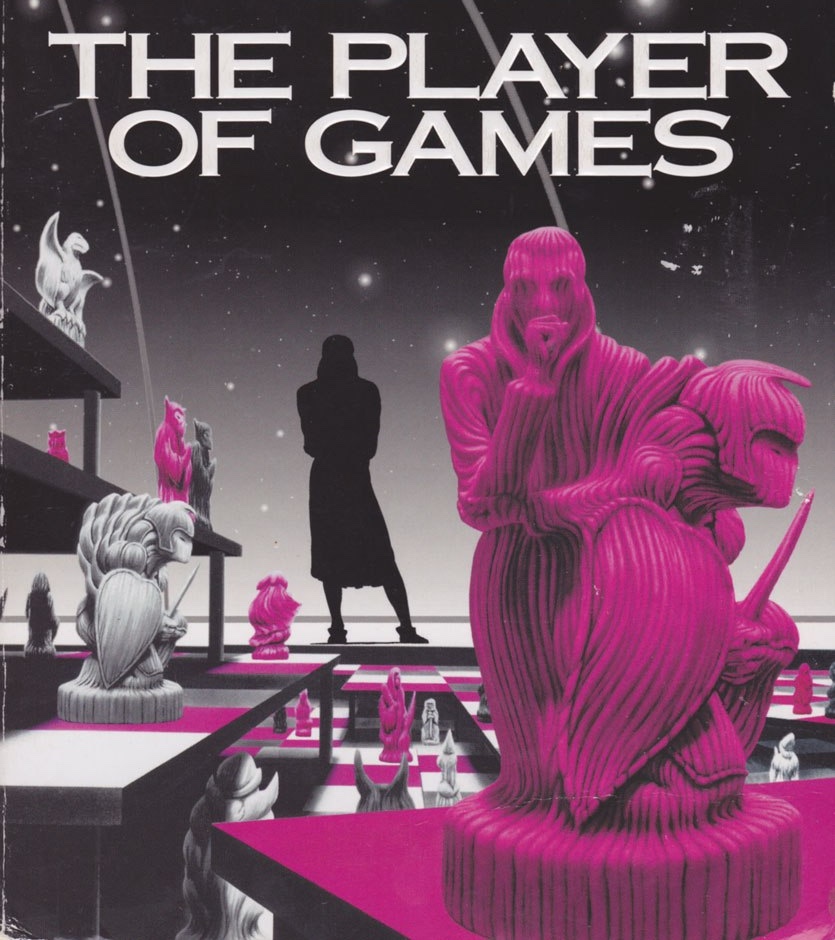In the vast realm of science fiction literature, there are works that stand out as seminal, genre-defining pieces that leave an indelible mark on both readers and the genre itself. One such literary gem is “Player of Games” by the renowned British author Iain M. Banks. Published in 1988, this novel is the second installment in Banks’ Culture series, and it has captivated the imaginations of readers for decades. In this article, we will delve deep into the world of “Player of Games,” exploring its intricate plot, key characters, underlying themes, the inspiration behind the book, reviews and cultural impact, as well as providing examples of similar books and a glimpse into the broader bibliography of Iain M. Banks.
Plot: A Game of Galactic Proportions
“Player of Games” takes place in the expansive universe of the Culture, a post-scarcity, utopian civilization where advanced technology has eradicated poverty, disease, and war. The story centers around the enigmatic and highly skilled game player, Jernau Morat Gurgeh, who is renowned throughout the Culture for his mastery of strategy games.
Gurgeh, feeling somewhat disillusioned with the utopian nature of the Culture, is approached by a sentient, hyper-intelligent spaceship known as a Mind, which invites him to participate in a unique and highly prestigious game called Azad. Azad is more than just a game; it is the defining cultural and political institution of the Azadian Empire, a vast and brutal civilization that thrives on hierarchy, brutality, and inequality. To win the game of Azad is to rise to the highest echelons of Azadian society, and Gurgeh accepts the challenge.

As the story unfolds, Gurgeh’s journey takes him to the heart of the Azadian Empire, where he must navigate not only the intricacies of the game but also the treacherous politics and power struggles of a society built on oppression. “Player of Games” is a thrilling exploration of strategy, identity, and morality as Gurgeh confronts the harsh realities of a society that stands in stark contrast to the Culture.
Key Characters: Jernau Morat Gurgeh and Beyond
At the heart of “Player of Games” is the complex character of Jernau Morat Gurgeh. He is a multi-faceted protagonist, brilliantly talented at games yet somewhat adrift in the utopian paradise of the Culture. Gurgeh’s journey is not just a physical one but also an internal exploration of his own values and beliefs.
Another notable character is the sentient spaceship that invites Gurgeh to the Azad game, which goes by the name of the Limiting Factor. This Mind is not only a vessel but also a highly intelligent being with its own motivations and personality, adding depth to the narrative.
Within the Azadian Empire, Gurgeh encounters a range of characters, from fellow players in the Azad game to politicians and power brokers, each with their own agendas and quirks. These characters contribute to the rich tapestry of the novel, providing both allies and adversaries for Gurgeh as he navigates this foreign and dangerous world.
Key Themes: Strategy, Identity, and Morality
“Player of Games” grapples with several key themes that resonate with readers on multiple levels. One of the most prominent themes is the concept of strategy. As Gurgeh engages in the complex game of Azad, readers are drawn into a world of tactical thinking, cunning maneuvers, and strategic brilliance. The novel explores the intricate interplay of tactics and ethics, posing questions about the limits one should go to achieve victory.
Identity is another central theme. Gurgeh’s journey forces him to confront not only the identity of the Culture but also his own sense of self. As he immerses himself in the Azadian culture, he must grapple with the question of whether winning at Azad is worth compromising his own values and beliefs. This internal struggle adds depth to the character and the narrative.
Morality is a third major theme. The juxtaposition of the Culture’s utopian ideals with the brutal reality of the Azadian Empire highlights the ethical dilemmas that Gurgeh faces. The novel raises profound questions about the nature of morality, the relativity of cultural values, and the consequences of one’s choices in a morally ambiguous world.
What Inspired the Book: Iain M. Banks’ Vision
To truly appreciate “Player of Games,” it’s essential to understand the inspiration behind the book. Iain M. Banks, a visionary author known for his inventive and thought-provoking science fiction, was inspired by a combination of factors.
First and foremost, Banks drew inspiration from his own fascination with games and strategy. He was an avid player of board games, particularly the game Diplomacy, which involves complex negotiations and alliances. This love of strategy games is evident in the intricate game of Azad that forms the centerpiece of the novel.
Banks also drew inspiration from his interest in anthropology and sociology. He was intrigued by the idea of creating a fictional society, the Culture, and exploring how it would interact with other civilizations. The Azadian Empire serves as a stark contrast to the Culture, allowing Banks to delve into sociopolitical commentary and explore the consequences of different societal structures.
Additionally, Banks was influenced by the political and cultural landscape of the 1980s, with its Cold War tensions and the clash of ideologies. This backdrop of geopolitical conflict and ideological rivalry can be seen in the broader context of the novel, where the Culture and the Azadian Empire represent contrasting worldviews.
Reviews and Cultural Impact: A Literary Triumph
“Player of Games” received widespread acclaim from both critics and readers upon its release, and its impact on the world of science fiction has been enduring. The novel’s thought-provoking themes, intricate world-building, and compelling characters earned it a place among the genre’s classics.
Critics lauded Banks’ ability to blend high-concept science fiction with deep philosophical questions. The novel’s exploration of morality, ethics, and the consequences of one’s choices resonated with readers, sparking discussions that continue to this day.
Beyond its critical acclaim, “Player of Games” has had a cultural impact, influencing subsequent generations of science fiction authors. It introduced readers to the Culture, a universe that would become a central setting for many of Banks’ later works. The Culture series, of which “Player of Games” is a part, has become a cornerstone of modern space opera and a touchstone for those interested in utopian and post-scarcity science fiction.
Examples of Similar Books: Exploring the Genre
For readers who have been captivated by the themes and style of “Player of Games,” there are several other science fiction novels that offer similar experiences:
1. “Dune” by Frank Herbert: Like “Player of Games,” “Dune” is a sprawling space opera that delves into complex political and cultural systems. It explores themes of power, religion, and ecology in a richly detailed universe.
2. “Ender’s Game” by Orson Scott Card: This novel shares a focus on strategy and gamesmanship, with a young protagonist navigating a future world filled with political intrigue and moral dilemmas.
3. “The Dispossessed” by Ursula K. Le Guin: Le Guin’s novel explores themes of utopian societies and the clash of contrasting cultures, much like “Player of Games.” It’s a deep dive into anarchist philosophy and social experimentation.
4. “Snow Crash” by Neal Stephenson: For readers who enjoy the fusion of technology, virtual reality, and societal critique, “Snow Crash” offers a cyberpunk alternative with a healthy dose of satire.
5. “The Expanse” series by James S.A. Corey: This series, beginning with “Leviathan Wakes,” offers a gripping space opera with political intrigue, moral complexity, and a focus on the consequences of human actions.
Other Books by Iain M. Banks: A Literary Odyssey
While “Player of Games” is undoubtedly one of Iain M. Banks’ standout works, his bibliography is a treasure trove of imaginative and thought-provoking science fiction. Here are a few notable entries:
1. “Consider Phlebas” (1987): The first book in the Culture series, this novel introduces readers to the enigmatic universe of the Culture and its morally ambiguous interactions with other civilizations.
2. “Use of Weapons” (1990): This installment in the Culture series follows an unconventional protagonist on a mission that explores the consequences of his past actions. It’s a deep dive into the complexities of identity and morality.
3. “The Algebraist” (2004): While not part of the Culture series, this standalone novel showcases Banks’ talent for world-building and intricate plots, offering a unique space opera experience.
4. “Excession” (1996): This Culture novel explores the appearance of an enigmatic and immensely powerful alien artifact, raising questions about the limits of knowledge and control.
5. “Matter” (2008): In this novel, Banks weaves together multiple storylines, exploring themes of hierarchy, power, and the clash of cultures within a vast, multi-layered universe.
Player of Games
In conclusion, “Player of Games” stands as a testament to the genius of Iain M. Banks, offering readers a gripping tale of strategy, morality, and identity within the backdrop of a meticulously crafted science fiction universe. Its enduring impact on the genre and its exploration of profound themes ensure that it will continue to captivate and challenge readers for generations to come. So, if you’re seeking a literary journey into the heart of science fiction, embark on the Azad game with Jernau Morat Gurgeh and experience the brilliance of “Player of Games” for yourself.
Sources:


